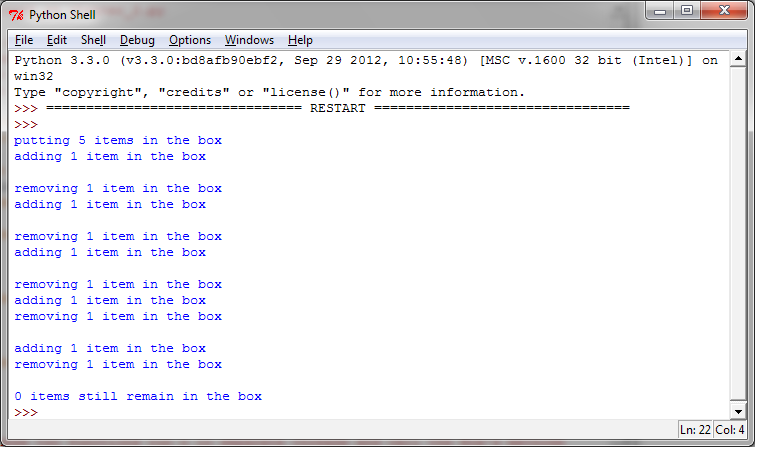Python并行编程
- 本书说明
- 1 认识并行计算和Python
- 1.1 介绍
- 1.2 并行计算的内存架构
- 1.3 内存管理
- 1.4 并行编程模型
- 1.5 如何设计一个并行程序
- 1.6 如何评估并行程序的性能
- 1.7 介绍Python
- 1.8 并行世界的Python
- 1.9 介绍线程和进程
- 1.10 开始在Python中使用进程
- 1.11 开始在Python中使用线程
- 2 基于线程的并行
- 2.1 介绍
- 2.2 使用Python的线程模块
- 2.3 如何定义一个线程
- 2.4 如何确定当前的线程
- 2.5 如何实现一个线程
- 2.6 使用Lock进行线程同步
- 2.7 使用RLock进行线程同步
- 2.8 使用信号量进行线程同步
- 2.9 使用条件进行线程同步
- 2.10 使用事件进行线程同步
- 2.11 使用with语法
- 2.12 使用 queue 进行线程通信
- 2.13 评估多线程应用的性能
- 3 基于进程的并行
- 3.1 介绍
- 3.2 如何产生一个进程
- 3.3 如何为一个进程命名
- 3.4 如何在后台运行一个进程
- 3.5 如何杀掉一个进程
- 3.6 如何在子类中使用进程
- 3.7 如何在进程之间交换对象
- 3.8 进程如何同步
- 3.9 如何在进程之间管理状态
- 3.10 如何使用进程池
- 3.11 使用Python的mpi4py模块
- 3.12 点对点通讯
- 3.13 避免死锁问题
- 3.14 集体通讯:使用broadcast通讯
- 3.15 集体通讯:使用scatter通讯
- 3.16 集体通讯:使用gather通讯
- 3.17 使用Alltoall通讯
- 3.18 简化操作
- 3.19 如何优化通讯
- 4 异步编程
- 4.1 介绍
- 4.2 使用Python的 concurrent.futures 模块
- 4.3 使用Asyncio管理事件循环
- 4.4 使用Asyncio管理协程
- 4.5 使用Asyncio控制任务
- 4.6 使用Asyncio和Futures
- 5 分布式Python编程
- 5.1 介绍
- 5.2 使用Celery实现分布式任务
- 5.3 如何使用Celery创建任务
- 5.4 使用SCOOP进行科学计算
- 5.5 通过 SCOOP 使用 map 函数
- 5.6 使用Pyro4进行远程方法调用
- 5.7 使用 Pyro4 链接对象
- 5.8 使用Pyro4部署客户端-服务器应用
- 5.9 PyCSP和通信顺序进程
- 5.10 使用Disco进行MapReduce
- 5.11 使用RPyC远程调用
- 6 Python GPU编程
使用RLock进行线程同步
如果你想让只有拿到锁的线程才能释放该锁,那么应该使用 RLock() 对象。和
Lock() 对象一样, RLock() 对象有两个方法: acquire() 和
release() 。当你需要在类外面保证线程安全,又要在类内使用同样方法的时候
RLock() 就很实用了。
(译者注:RLock原作解释的太模糊了,译者在此擅自添加一段。RLock其实叫做"Reentrant Lock",就是可以重复进入的锁,也叫做"递归锁"。这种锁对比Lock有是三个特点:1. 谁拿到谁释放。如果线程A拿到锁,线程B无法释放这个锁,只有A可以释放;2. 同一线程可以多次拿到该锁,即可以acquire多次;3. acquire多少次就必须release多少次,只有最后一次release才能改变RLock的状态为unlocked)
如何做
在示例代码中,我们引入了 Box 类,有 add() 方法和 remove()
方法,提供了进入 execute() 方法的入口。 execute() 的执行由 Rlock()
控制: :
import threading
import time
class Box(object):
lock = threading.RLock()
def __init__(self):
self.total_items = 0
def execute(self, n):
Box.lock.acquire()
self.total_items += n
Box.lock.release()
def add(self):
Box.lock.acquire()
self.execute(1)
Box.lock.release()
def remove(self):
Box.lock.acquire()
self.execute(-1)
Box.lock.release()
## These two functions run n in separate
## threads and call the Box's methods
def adder(box, items):
while items > 0:
print("adding 1 item in the box")
box.add()
time.sleep(1)
items -= 1
def remover(box, items):
while items > 0:
print("removing 1 item in the box")
box.remove()
time.sleep(1)
items -= 1
## the main program build some
## threads and make sure it works
if __name__ == "__main__":
items = 5
print("putting %s items in the box " % items)
box = Box()
t1 = threading.Thread(target=adder, args=(box, items))
t2 = threading.Thread(target=remover, args=(box, items))
t1.start()
t2.start()
t1.join()
t2.join()
print("%s items still remain in the box " % box.total_items)运行结果如下:

讨论
主程序的代码几乎和之前的例子一样。两个线程 t1 和 t2 分别分配了
adder() 函数和 remover()
函数。当item的数量大于0的时候,函数工作。调用 RLock() 的位置是在 Box
类内: :
class Box(object):
lock = threading.RLock()adder() 和 remover() 两个函数在 Box 类内操作items,即调用 Box
类的方法: add() 和 remove()
。每一次方法调用,都会有一次拿到资源然后释放资源的过程。至于 lock()
对象, RLock() 对象有 acquire() 和 release()
方法可以拿到或释放资源;然后每一次方法调用中,我们都有以下操作: :
Box.lock.acquire()
# ...do something
Box.lock.release()